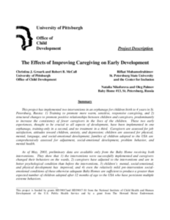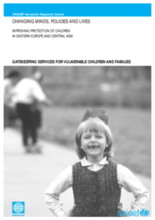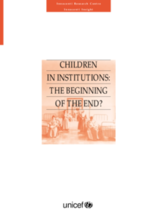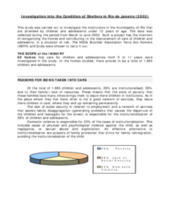Displaying 621 - 630 of 662
The objective of this research project is to contribute to the process of facilitating a more family-like childhood for Russian orphans.
Through a review of orphanages in St. Petersburg, Russia, this study examines the causal roles of consistency in caregivers and appropriate caregiving behaviors in the social, emotional, and development of young children.
Practical guidance, case examples, and tools to assess, monitor, and evaluate child protection services and facilitate reform away from institutionalization of children.
A statement, by UNICEF for the Stockholm Conference on Residential Care, which recommends a move away from institutional care for children and offers the ‘protective environment’ framework as a solution which encourages protective legislations and policies, public debate, government commitment and the need to listen to the children. The statement includes lessons learned about the issue of children without family care and recommendations for reform.
This publication provides an account of historical processes in Spain and Italy which have led to a transformation of social child protection policies and an abandonment of the most widely-used mechanism of social exclusion, namely institutionalization.
A paper in a series of papers that discusses the problems associated with changing social protection services and provides guidelines to aid countries restructure their financing systems for social care. The paper proposes more family-based and inclusive care programs and less institutional care.
This paper outlines the International Save the Children Alliance’s position on residential care. It addresses the proliferation of residential care, its negative impact on children and the need for international attention. The paper presents the work of Save the Children and other agencies in order to highlight relevent issues and to provide a guide for those working with separated children.
Provides an overview of social service provision in Eastern Europe and Central Asia, and provides information on ways to move resources away from institutional care, and into community-based social services. Contains specific examples from Latvia, Iceland, Sweden, Romania and other transitioning countries.
This research study provides statistical information on institutional care of children under the age of 12 in Rio de Janeiro, Brazil. Interviews with institutions and children are conducted, and reasons for separation from family, length of time in care, status of family relationship, religious orientation and financial support of the institutions are highlighted.
This report is the result of a seminar held in Kazakhstan 2004. It focuses on social welfare sector reform, and includes topics such as expanding legislative agendas and financing frameworks, as well as gate keeping. Case studies of reform processes from Romania, Tajikistan and Serbia are discussed. Includes conference agenda.









